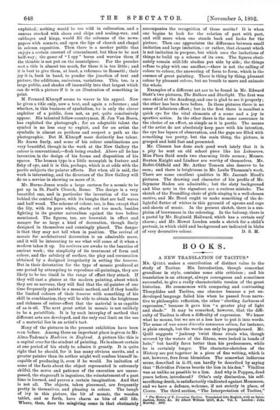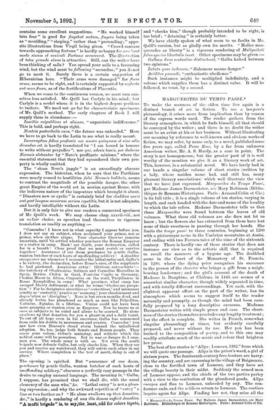BOOKS.
A NEW TRANSLATION OF TACITITS.*
MR. QUILL makes a contribution of distinct value to the study of Tacitus. His Introduction, though somewhat grandiose in style, contains some able criticism ; and his translation is an attempt, always courageous and sometimes successful, to give a really characteristic version of the great historian. He commences with comparing and contrasting Thucydides and Tacitus, one obscure because a yet un- developed language failed him when he passed from narra- tive to philosophic reflection, the other electing darkness of expression," because it gave him " a greater play of light and shade." It may be remarked, however, that the diffi- culty of Tacitus is often a difficulty of expression. We know what he means, but we are at a loss how to put it into words. The sense of uno amine discretis connexum odium, for instance, is plain enough, but the words can only be paraphrased. Mr. Quill suggests " jealousy 'twixt those rivals who, though severed by the waters of the Rhone, were locked in bonds of hate," but hardly fares better than his predecessors, while be is certainly longer. The character-sketches of the History are put together in a piece of fine writing, which is not, however, free from blemishes. The somewhat ludicrous scene, described in ii.-91, can hardly be described by saying that "Helvidius Prisons beards the lion in his den." Vitellins was as unlike as possible to a lion. And why is Poppma, dead years before, introduced ? Otho's only distinction, his self- sacrificing death, is satisfactorily vindicated against Mommsen, and we have a defence, welcome, if not strictly in place, of Cicero. The third section, " The Interpretation of Tacitus," • The History of P. Cornelius Tacitus. Translated into English, with an Intro- duction, Notes, &c. By Albert William Quill, M.A. Vol. L London : John Murray,. 1892. contains some excellent suggestions. " He worked himself into fear" is good for fingebat metum, fingers being taken as " moulding," " shaping," rather than " pretending ; " appo- site illustrations from Virgil being given. " Crowd canvass towards approaching fortune" is hardly so happy for pa nr7eret modo sinum et venienti Fortuna occurreret. The illustration of totes prande sinus is attractive. Still, can the writer have been thinking- of sails P You spread your sails to a favouring wind, but the wind must be following " secnndus ; " you do not go to meet it. Surely there is a certain suggestion of Hibernicism here. "Their arms were damaged" for flaw arena, seems to be right, and is certainly supported by negleeta ant aevo fluxa, as of the fortifications of Placentia.
When we come to the continuous version, we must own our- selves less satisfied. Mr. Quill has Carlyle in his mind ; but Carlyle is a model whom it is in the highest degree perilous to imitate. We need not go far for characteristic specimens of Mr. Quill's method. The early chapters of Book I. will supply them in abundance :— Inseitia, reipublicae ut alienee, " unpatriotic indifference." This is bold, and perhaps right.
Neutris posteritatia cura," the future was unheeded." Here we have to go back to the Latin to see what is really meant.
Incorruptam fidern professis nee am-ore quisquam et sine odio dicendus eat, is hardly translated by "I am bound in honour to write without prejudice "; nor qui, adesis bonis, per dedecus Neronis alebantur by "Nero's profligate minions," where the essential statement that they had squandered their own pro- perty is wholly omitted.
The " sham Nero's juggle " is an exceedingly obscure expression. The historian, when he says that the Parthians were nearly roused to hostilities falsi Neronis ludibrio, seems to contrast the magnitude of the possible danger, the other great Empire of the world set in motion against Rome, with the ludicrous nature of the imposture which brought it about. " Disasters new or cyclic" is certainly brief for cladibus novis ant post longam annorum, seriem repetitis, but it is not adequate, and hardly intelligible without the Latin.
But it is only fair to give our readers a connected specimen of Mr. Quill's work. We may choose chap. xxxvii-viii., not an unfair choice, as speeches lend themselves to vigorous translation as readily as anything :—
" Comrades ! I know not in what capacity I appear before you. I dare not say as subject, when acclaimed your prince, nor as prince, when another reigns. Your character likewise remains uncertain, until 'tis settled whether you have the Roman Emperor or a traitor in camp. Hark ! my death, your destruction, called for in a breath ! Clear proof that we must perish or survive together ! Assurance of our doom perchance by gentle Galba, wanton butcher of such hosts of unoffending soldiery ! A shudder creeps over me whenever I remember the lethal entry and, Galba's s le victory, the decimation, before Rome's eyes, of the suppliants he had pardoned. Auspicious entry ! Glorious antecedents !- the butchery of Obultronius Sabinus and Cornelius Marcellus in Spain, Betuus Cbilon in Gaul, Fonteius Capito in Germany, Clodius Macer in Africa, Cingonius on the road, Turpilianus in Rome. Nymphidius in camp ! What province, what camp has escaped bloody defilement, or what he terms wholesome purga- tion ? For he designates atrocities as correctives,' and misnames cruelty as austerity,' avarice as economy,' your chastisement and degradation as discipline '; Nero is but seven months dead, and already Icelms has plundered as much as men like Polyclitus, Vatinius, JEgialus, in a lifetime. Vinius could not have been more grasping or wanton even as Emperor. Now he treats us at once as subjects to be ruled and aliens to be scorned. He alone swallows up that donative, for you a phantom and a daily taunt. To cut off all hope even in his successor, Galba has summoned from exile his double in moroseness and avarice. Comrades ! you saw how even Heaven's dread storm banned the unhallowed adoption. So, too, judge both Senate and Roman people. They crave your valour, virtue's mainstay, and without which the noblest cause will be powerless. Not to war or danger do I sum- mon you. The whole army is with us. Not even the mufti hi igade now defends Galba., but only checks him. When they see you and receive my watcbward, they will outvie each other in my service. Where completion is the test of merit, delay is out of place."
The opening is spirited. Bnt " assurance of our doom, perchance by gentle Galba, wanton butcher of such hosts of unoffending soldiery," obscures a perfectly easy passage in the desire to employ unusual language. The meaning is, " Galba, I suppose, has promised that we shall die, with the usual clemency of the man who," &c. "Lethal entry" is not a pleas- ing expression ; and why the awkward repetition of " entry " a line or two further on P " He alone swallows up that donative, &c.," is hardly a rendering of tuna ilia domus sufficit donativo. "A mufti brigade" is, to sayithe, leant, dd for ohm tovatti, and "checks him," though probably intended to be right, is too brief ; " detaining " is certainly better.
We have chiefly spoken of what seem to us faults in Mr. Quill's version, but as gladly own its merits. " Malice mas- querades as liberty" is a vigorous rendering of Malignitati falsa species libertatis inest. Other specimens may be given :— Galbam duce aententiae distincbant, " Galba halted between two opinions."
Intuta quae indecora, " dishonour means danger."
Aviditas parendi, "enthusiastic obedience."
Such instances might be multiplied indefinitely, and a volume which supplies them has a distinct value. It will be followed, we trust, by a second.























































 Previous page
Previous page